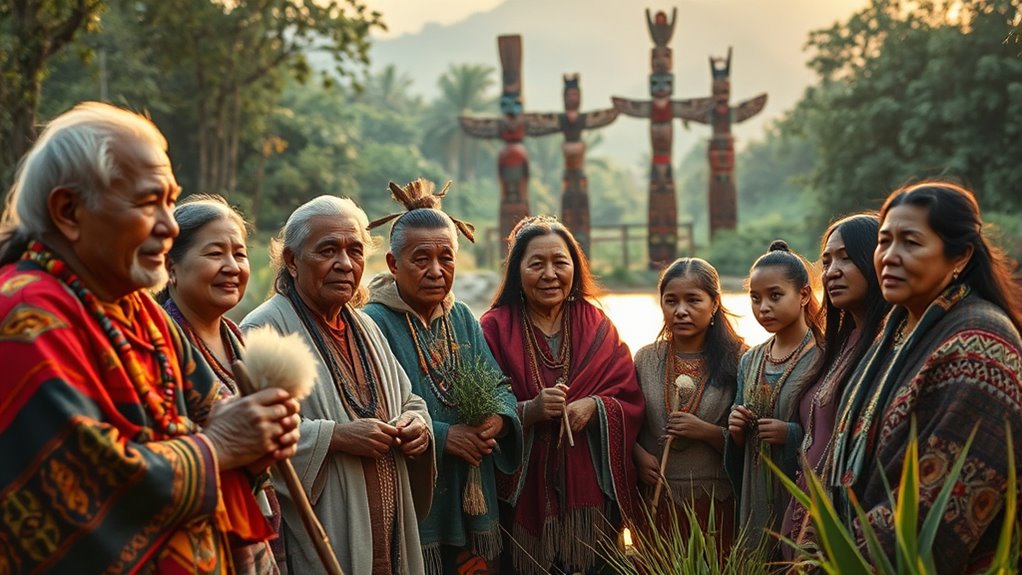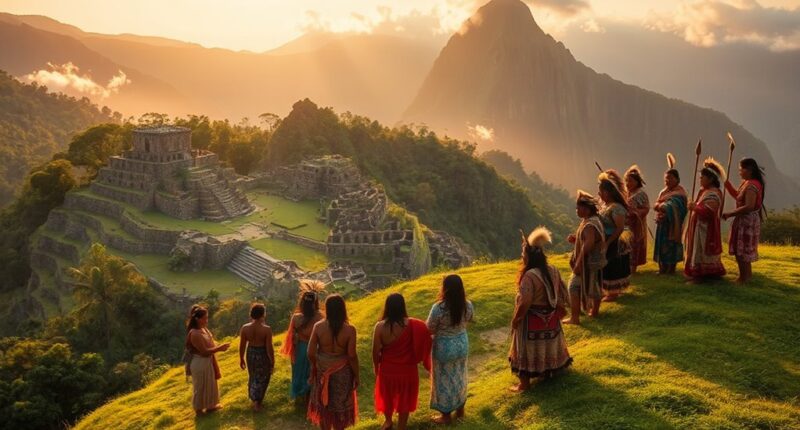Indigenous knowledge plays a key role in guiding climate solutions by offering time-tested practices rooted in cultural resilience. You can see how traditional techniques in farming, water management, and rituals help communities adapt to environmental changes while maintaining their identity. These practices serve as sustainable solutions aligned with local ecosystems. If you explore further, you’ll discover how empowering communities to preserve and innovate their traditions creates powerful tools for climate resilience.
Key Takeaways
- Indigenous knowledge offers sustainable, ecosystem-aligned farming and water management practices that enhance climate resilience.
- Traditional rituals and cultural practices reinforce community identity while providing adaptive responses to climate change.
- Active community involvement and local decision-making foster ownership and effective implementation of climate solutions.
- Intergenerational transfer of indigenous knowledge ensures the preservation and continuous adaptation of survival strategies.
- Integrating traditional practices with modern efforts strengthens resilience and promotes culturally respectful climate adaptation.

What allows cultures to withstand the pressures of change and adversity? It often comes down to their deep-rooted traditional practices and the strength of community empowerment. These elements serve as the backbone of resilience, enabling communities to adapt and thrive despite external challenges. Traditional practices, passed down through generations, are more than just customs; they are a repository of collective knowledge about local environments, resources, and survival strategies. When faced with climate shifts or economic upheaval, these practices provide a framework that helps communities respond effectively and maintain their identity. For example, indigenous farming techniques, water management systems, or ceremonial rituals are tailored to local ecosystems, offering sustainable solutions that modern methods may overlook. Additionally, the intergenerational transfer of knowledge ensures that vital survival skills remain alive and adaptable over time.
Traditional practices and community empowerment are vital for cultural resilience amid change and adversity.
Community empowerment plays a pivotal role here. When people are actively involved in decision-making and their voices are valued, they develop a sense of ownership over their cultural and environmental resources. This empowerment encourages resilience because it fosters local leadership, collective problem-solving, and the ability to mobilize resources quickly in times of crisis. It transforms communities from passive recipients of aid into active agents of change. Indigenous groups, in particular, often lead conservation efforts rooted in their traditional knowledge, which has proven to be highly effective for climate adaptation. Their ability to mobilize community efforts around shared goals creates a resilient network capable of withstanding external shocks.
The integration of traditional practices with community empowerment also enhances the transmission of indigenous knowledge, ensuring it stays relevant and alive. When communities recognize the value of their heritage, they’re more likely to protect and adapt these practices to new threats, including climate change. This process encourages intergenerational learning, where elders pass down wisdom, and youth bring fresh perspectives, fostering innovation grounded in tradition. Furthermore, community empowerment fosters social cohesion, which is essential for resilience. When people feel connected and responsible for their collective well-being, they’re more motivated to collaborate and sustain their cultural identity through difficult times.
In essence, the resilience of cultures isn’t accidental. It’s built on the foundation of traditional practices that serve as a survival toolkit and the empowerment of communities to take charge of their future. Together, these elements create a dynamic system capable of adapting to change while preserving cultural integrity. Recognizing and supporting these indigenous strengths isn’t just about respecting heritage — it’s about harnessing their proven strategies to develop sustainable, climate-resilient solutions that benefit everyone.
Frequently Asked Questions
How Do Indigenous Practices Adapt to Modern Climate Challenges?
You see indigenous practices adapt to modern climate challenges by blending traditional farming methods with new technologies, making agriculture more sustainable. They emphasize forest conservation, protecting ecosystems that store carbon and support biodiversity. By integrating age-old wisdom with contemporary science, these communities create resilient strategies that mitigate climate impacts, preserve natural resources, and foster sustainable living. Their approach demonstrates how respecting and applying indigenous knowledge can effectively address today’s environmental crises.
What Are Examples of Successful Indigenous-Led Climate Initiatives?
Imagine harnessing ancient wisdom to shape our future—Indigenous-led climate initiatives excel at this. Your focus on Traditional Ecological Knowledge and Cultural Land Management has led to successes like the First Nations’ forest conservation projects and sustainable fishing practices. These initiatives demonstrate how respecting Indigenous practices not only preserves ecosystems but also offers effective, culturally rooted solutions to modern climate challenges, inspiring broader global efforts.
How Is Indigenous Knowledge Integrated Into National Climate Policies?
You see that indigenous knowledge is integrated into national climate policies through efforts that emphasize cultural preservation and traditional stewardship. Policymakers actively consult indigenous communities, incorporating their insights on sustainable land management and resource use. This collaboration helps develop strategies rooted in cultural practices, ensuring environmental protection aligns with indigenous values. By valuing traditional stewardship, nations create more inclusive policies that honor indigenous contributions to climate resilience.
What Challenges Do Indigenous Communities Face in Sharing Their Knowledge?
You face challenges when sharing indigenous knowledge, mainly related to protecting intellectual property and cultural preservation. Often, this knowledge is misappropriated or used without permission, risking loss of cultural identity. You may also encounter skepticism or lack of understanding from others, making it harder to share your insights. These barriers hinder meaningful collaboration and the respectful integration of your knowledge into broader climate solutions, emphasizing the need for safeguards and respect.
How Can Non-Indigenous Groups Support Indigenous Climate Resilience Efforts?
Imagine a shared garden where your hands help plant seeds of change. You can support indigenous climate resilience by respecting their cultural preservation and actively engaging with communities. Listen to their stories, honor their traditions, and collaborate on sustainable projects. Your involvement can foster trust and empowerment, ensuring their knowledge thrives. Together, you create a resilient future rooted in respect, understanding, and shared responsibility for our planet’s health.
Conclusion
Think of indigenous knowledge as a mighty oak standing strong through storms. Its roots run deep, anchoring us in traditions that guide sustainable climate solutions. By listening to these ancient whispers, you become part of a resilient forest, thriving amid changing winds. Embracing this wisdom isn’t just preservation—it’s the seed for a future where nature and culture grow together, resilient and flourishing. Together, you hold the power to nurture this enduring, life-giving tree.










